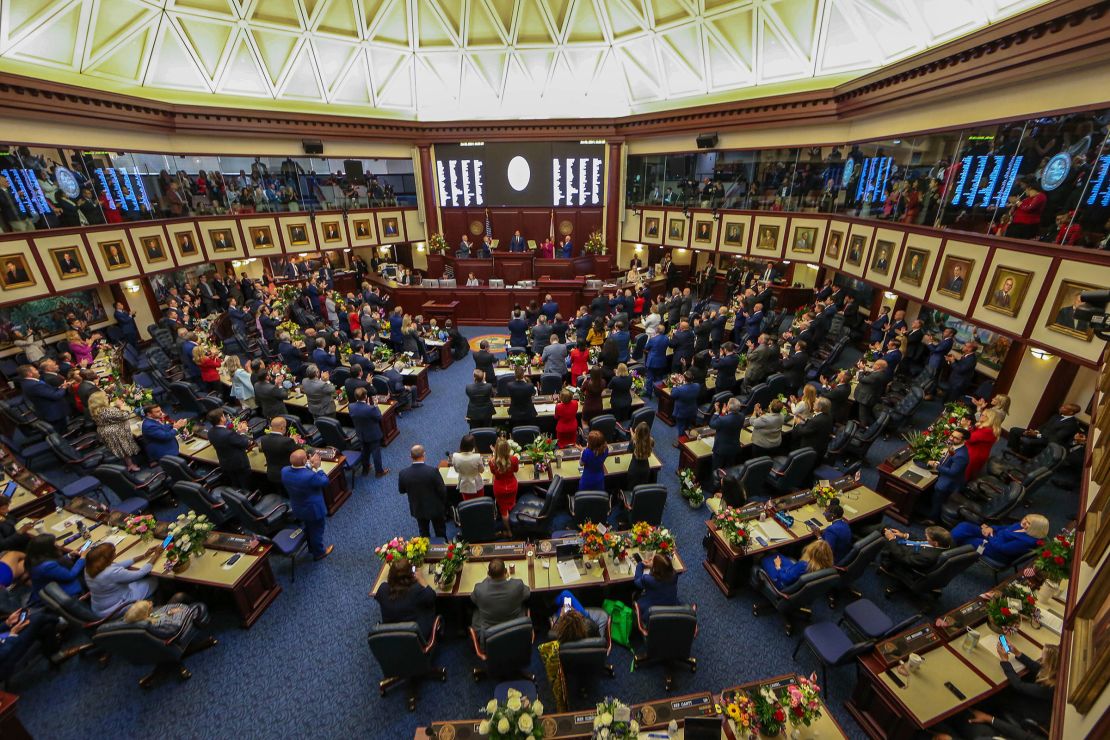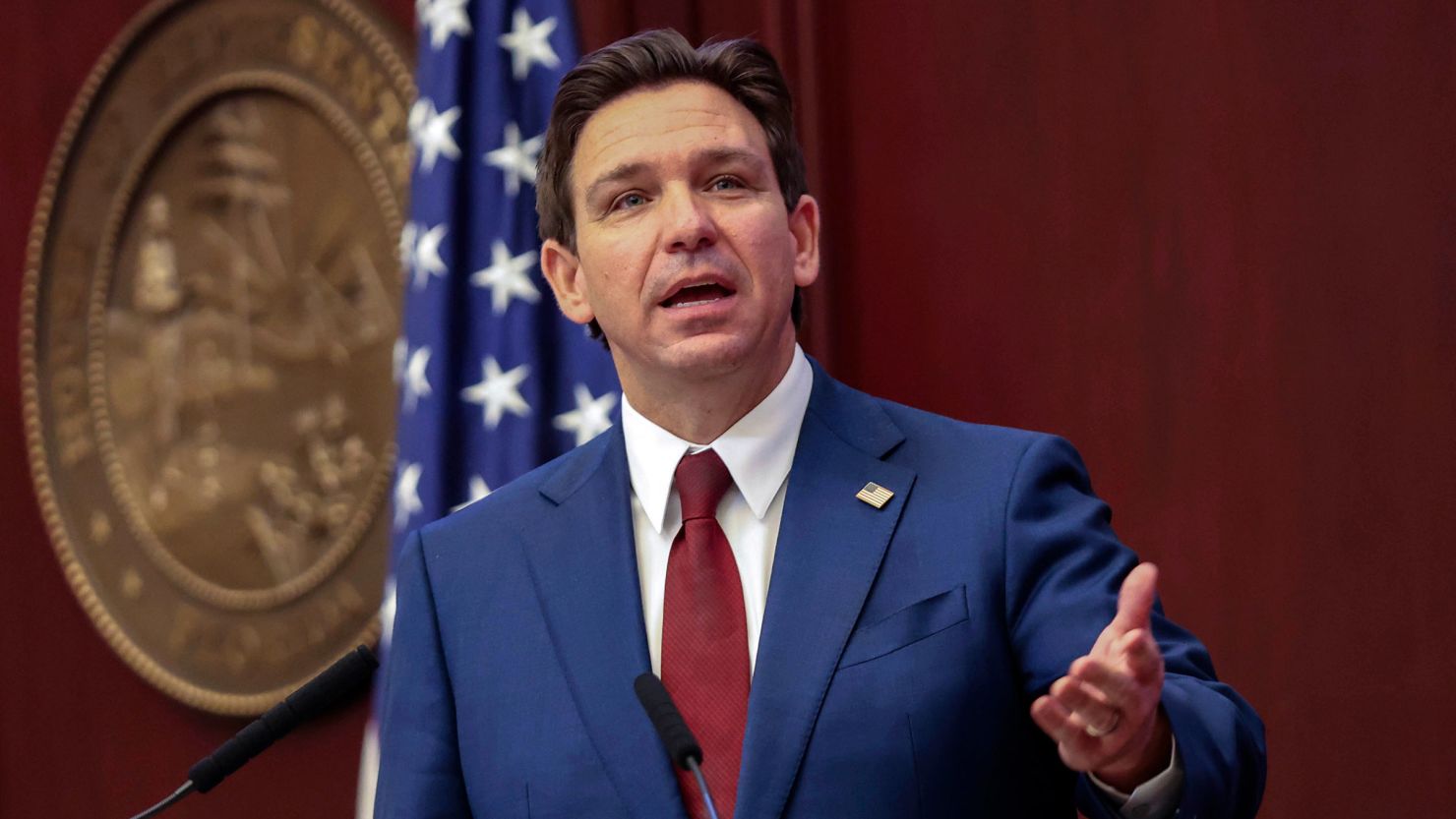Gov. Ron DeSantis kicked off Florida’s legislative session on Tuesday with a deeply political speech that drew sharp contrasts between his conservative stewardship and Democratic leadership and seemed tailored to the Iowans who will soon decide the fate of his White House bid.
“We are in the midst of a great upheaval throughout the nation,” DeSantis began his annual State of the State address, before sharing a dark view of the current status of the country and Democratic-run cities like San Francisco, Chicago and Washington, DC.
He ended with a line that nodded to a mission that extended well beyond Florida’s boundaries.
“Together, we will keep Florida free and provide hope for a revival of the American spirit throughout these United States,” he said.
The remarks from Tallahassee come six days before the Iowa caucuses and amid a Midwest blizzard that forced some of his rivals to cancel campaign events in the Hawkeye State. For DeSantis, who has staked his political future on a strong showing in the first nominating contest, the 1,000-mile detour from Iowa to his state capitol marked a rare hiatus from the campaign trail after spending most of the second half of 2023 and the early days of 2024 on the road.
Just as he has in dozens of appearances in Iowa, DeSantis recounted at length his political victories in Florida. He was especially complimentary of the Republican-controlled legislature’s work in 2023 – which he called “monumental” – when lawmakers passed a slate of bills that have served as a platform for his presidential campaign.
“We have put forth a blueprint for America’s revival that has instilled hope into the hearts of millions that a new birth of freedom can emanate from this land once more,” he said.

At one point, DeSantis quickly ran through a list of more than a dozen conservative policy accomplishments – including new laws to ban Covid-related restrictions, expansion of gun rights and a ban on most abortions after six weeks into a pregnancy. He described how he “kneecapped ESG” – a movement to invest in ways that are mindful of environmental, social and governance priorities – and “banned China from buying land in Florida.”
“Let’s see some other state match that list of achievements,” DeSantis said.
But so far, there are few signs that a majority of Republicans in Iowa, New Hampshire or anywhere else are convinced DeSantis’ Florida “blueprint” provides a better path forward for the party than renominating former president Donald Trump.
In the Florida capital city that helped launch DeSantis’ presidential ambitions, optimism about his odds of winning the nomination are waning and expectations are settling in that the governor may return sooner rather than later.
“Everybody in Tallahassee thinks that Iowa will put the knife in him and New Hampshire will twist the knife,” one longtime Republican operative and lobbyist in Tallahassee said.
The prevailing sentiment here is a stark reversal from a year ago, when DeSantis was the toast of the town coming off a dominating performance in his November 2022 reelection and stood at the zenith of his political power. Then, his State of the State speech kicked off the unofficial countdown to his highly anticipated presidential campaign launch, and his fingerprints were all over the ensuing legislative session, when Republican lawmakers muscled through a contentious agenda engineered to appeal to the conservative voters who would help pick the next GOP nominee.
This year, DeSantis has publicly offered few details about his vision for the 60-day legislative session that begins Tuesday as he instead focuses on chasing Trump, the front-runner in the Republican primary, and fending off former South Carolina Gov. Nikki Haley. Nor is it clear how engaged he will be with state lawmakers, who are scheduled to meet until March 8 – three days after Super Tuesday on the GOP primary calendar.
The disconnect was captured by the lack of a forward-looking agenda in his relatively brief 35-minute speech. Soon after, DeSantis was scheduled to return to Des Moines for a town hall, though storms in both Tallahassee and Iowa may have other plans. DeSantis is also scheduled to participate in CNN’s debate on Wednesday with Haley.
“My message is simple: stay the course,” DeSantis said. “The state of our state is strong. Let’s keep doing what works. Let’s continue to make Florida the envy of the nation.”
DeSantis remains adamant that he is well positioned in Iowa, where Republicans often reward candidates who devote their time to traveling the state, as he has. A blizzard this week and an arctic blast forecast for Monday night, when Iowans head to their precincts, also serve as a reminder of the unpredictable nature of caucuses.
DeSantis has brushed aside questions about his long-term viability if he doesn’t exit Iowa with a win or second-place finish – suggesting he intends to watch the crucial business of lawmaking in his state from afar. DeSantis has yet to weigh in on some of the more contentious bills Florida Republicans have already filed, including measures to ease child labor laws for 16- and 17-year-olds, bar local governments from removing Confederate monuments, restrict mail-in voting for many Floridians and ban LGBTQ Pride flags at government buildings.
“We’re in it for the long haul,” he said of his presidential campaign in an interview with NBC and the Des Moines Register last week. “Don’t worry about that.”
But in Tallahassee, his political allies and foes are already anticipating how a defeated DeSantis may govern with an eye toward salvaging his legacy as governor and positioning himself for a political future in the Republican Party.
“It’s hard to make a calculus until you see how 2024 plays out,” a Republican fundraiser for DeSantis said. “What does the world look like after Trump wins or loses?”
State Rep. Randy Fine, a Republican lawmaker who last year flipped support from DeSantis to Trump, said those who went against the governor are anticipating payback.
“What I know is he spent five years getting ready to run for president and I don’t know if he will know what to do next,” Fine said. “Path one is to look to punish all of the people who he believes have wronged him and path two will look and say what went wrong and try to rebuild things.”
After Fine – the only Jewish Republican elected to the state Legislature – was not invited to the state’s annual Hanukkah gathering, he is not optimistic about DeSantis following the second path. As it is, Fine is submitting a funding request in the budget for only one of his priorities: more security for Jewish schools.
“Good luck vetoing that,” he said.
Regardless of DeSantis’ standing or his approach to governing going forward, the executive branch still yields considerable power. It explains why Republicans, consultants and lobbyists here won’t publicly attach their name to their criticisms of the governor. (Nor do they want to get overly presumptive about the outcome of a primary led by a 77-year-old former president who has divided GOP voters and is facing four indictments in state and federal courts.)
Many others remain ideologically aligned with DeSantis – including dozens of lawmakers who backed his presidential campaign over Trump – and they insist he worked in concert with rank-and-file Republicans to pass a conservative agenda last year and will continue to have an important role. Many of those Republican lawmakers, as well as his lieutenant governor and education commissioner, and the state’s attorney general, are planning to follow him to Iowa this weekend, where they will campaign on his behalf and help share stories of his political victories in Florida on caucus night, CNN reported Monday.
“With the impending presidential election discussion last year, people exaggerated just how subservient one independent branch of government was,” said state Rep. Alex Andrade, who is backing DeSantis for president. “But I never viewed us as a rubber stamp.”
Still, it remains to be seen whether DeSantis can command lawmakers like he has in recent years, when he called them into half a dozen special sessions to take up his political priorities, including his battle with Disney and his fight with local and federal governments over Covid-19. Florida governors are limited to two terms, making DeSantis a lame duck regardless of how his presidential campaign ends.
“Last year was clearly the height of his power. Everybody thought he was going to be heir apparent and their knees hurt from being on such bended knee, riding the wave and positioning themselves for an administration position,” the Republican operative and lobbyist said. “Now, they sense blood in the water.”
In the event he loses the nomination, Florida Democrats, who hold little sway in the halls of legislative and executive power, are nevertheless eager to remind their Republican colleagues how their efforts to boost DeSantis turned out for him and the state.
“The unfortunate part is all of this was done at the expense of people’s lives – Black people’s lives, immigrants’ lives, LGBTQ people’s lives – all for you to have a failing campaign,” said state Sen. Shevrin Jones, a Miami Democrat. “You wasted everyone’s time, including yours.”





